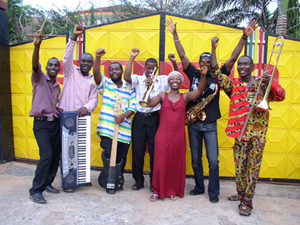Auditions in Africa

Students audition in Africa.
Berklee College of Music, the world's leading institution for the study of contemporary music, announces the creation of the Africa Scholars Program. The college will be holding audition and interview (A&I) events offering talented musicians the chance to be awarded scholarships to attend the college. Auditions, open to citizens of any African nation, will be conducted for the first time in Accra, Ghana, on June 15 and 16, and Durban, South Africa, on June 18 and 19. For more information or to apply, visit berklee.edu/scholarships/africa.
The Africa Scholars Program is designed to create opportunities for gifted African musicians who lack the financial means to study at Berklee. The program is also intended to enhance Berklee's presence in Africa and increase awareness of Berklee among African musicians. The college has previously visited Mozambique and Kenya, and plans to return to Africa next year. While other colleges have study abroad programs for American students, it is very uncommon for American colleges to recruit in other countries—particularly in Africa.
The Africa Scholar, to be admitted to the college in 2009, will be awarded a four-year, full-ride scholarship. African candidates who audition at A&I events in other cities will also be considered for this award. At the same time, musicians who audition in Accra and Durban in June will be considered for a host of other scholarships that Berklee awards annually as part of its World Scholarship Tour, where the college visits more than 40 international cities seeking musicians.
Berklee President Roger H. Brown and his wife Linda Mason, who have extensive experience living and working in Africa, established and funded the Africa Scholars Program in thanks to the kindness and intelligence of the many people they came to know while working in Africa, particularly mentors Francis Lutomia, headmaster of the school in Kenya where Brown taught, and Hasaan Gibreel, with whom Brown and Mason collaborated while leading the humanitarian organization Save the Children in Sudan.
While Brown and Mason were the catalysts for the program's creation, its implementation is a collaborative initiative extending not only across different departments at the college, but also beyond Berklee's walls. In an effort to make this program open to as many musicians as possible, Berklee has brought together a group of world-renowned artists and music professionals that includes several alumni to advise the college and help identify candidates for the auditions. The advisory board is comprised of Mulatu Astake '59 (the first African student to attend the college), Richard Bona, Darius Brubeck, Angelique Kidjo, Bakithi Kumalo, Lionel Loueke '00, Leni Stern '80, Stewart Sukuma '99, and Eric Wainaina '02.
Joe Galeota is an associate professor of percussion who has led an exchange program for Berklee students to study in Ghana for the past 11 summers. He's also helping to spread the word, and will be on hand in Ghana to assist with the auditions. Says Galeota, "I know a lot of musicians in Accra, and they're excited to spread it around to their potential candidates."
Ron Savage, chair of the Ensemble Department, and Carolyn Wilkins, professor of ensembles, will be leading the auditions at both sites, keeping in mind that they'll be seeing musicians with varied levels of playing experience. Says Wilkins, who has 19 years of experience auditioning students, "One of the things that Berklee does best is to evaluate raw talent. Many of our current students have come to us with unorthodox musical training. Quite a few of our students are self-taught." Other important factors taken into account are the student's work ethic, intelligence, and flexibility, which Wilkins sees as key elements for success, especially for students coming to Berklee from so far away.
Musicians come to Berklee from every corner of the earth, making the college uniquely international. While over 20 percent of the college's students are from outside the U.S.—among the largest percentages of all U.S. colleges and universities—and represent more than 70 countries, the Africa Scholars Program is part of a larger effort to increase the number of students from under-represented areas of the world, including Africa, China, India, and Cuba, fostering a significant cultural exchange.
Says Wilkins, "I have no doubt that bringing more students from Africa and Asia will be beneficial. Many of these students come from situations that Americans cannot even imagine. The fact that they have made such tremendous personal sacrifices just to be here has been humbling and inspiring. The opportunity to work with them towards our common goal of musical excellence will be a wonderful learning opportunity for everyone involved."
